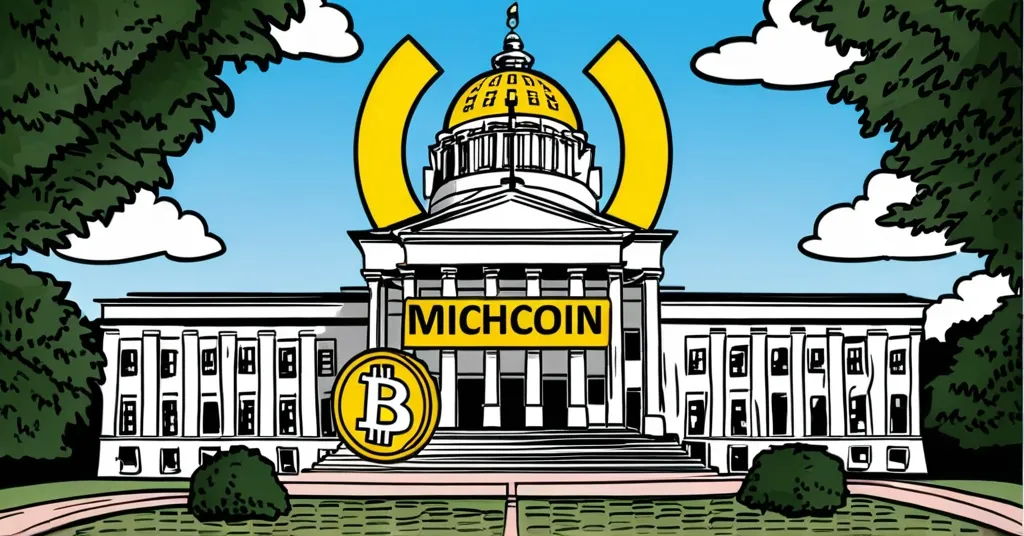Michigan Proposes Up to 10% of State Funds in Bitcoin Reserve and New Stablecoin, MichCoin

State-Led Crypto Adoption: Michigan Proposes Strategic Bitcoin Reserve
Michigan is making a bold move into the world of cryptocurrencies, with Representatives Bryan Posthumus and Ron Robinson introducing a bill, HB 4087, to establish a strategic Bitcoin reserve. This initiative could see up to 10% of the state’s funds invested in digital assets, including a proposed state-backed stablecoin, MichCoin.
- Michigan proposes Bitcoin reserve
- Up to 10% of state funds
- Introducing MichCoin
The Proposal: HB 4087 Explained
On February 13, 2025, Michigan’s Representatives Bryan Posthumus and Ron Robinson introduced HB 4087, a bill that aims to amend the state’s Management and Budget Act. This groundbreaking legislation would allow Michigan to allocate up to 10% of its general and economic stabilization funds (reserves set aside for financial emergencies) into cryptocurrencies. This move is part of a national trend, with twenty other US states also considering similar crypto reserve legislation. Michigan’s step towards financial diversification with digital assets showcases a growing acceptance of blockchain technology at the state level.
Introducing MichCoin
But Michigan’s ambitions don’t stop at Bitcoin. Representative Posthumus has proposed the creation of “MichCoin,” a state-backed stablecoin tied to Michigan’s gold and silver reserves. A stablecoin is a type of cryptocurrency designed to maintain a stable value, often by being pegged to a currency or commodity like gold. This innovative approach could set a new standard for how states leverage blockchain technology within their financial strategies. If MichCoin takes off, Michigan might just become the ‘Silicon Valley of Stablecoins.’ For more insights on the potential benefits and risks of state-backed stablecoins, see this discussion.
Secure Custody and Lending
HB 4087 also includes provisions for lending the state’s crypto holdings without increasing financial risk. To ensure the security of these investments, the legislation mandates that crypto assets must be held through secure custody or exchange-traded products (ETFs). ETFs are investment funds traded on stock exchanges, much like stocks, and are managed by registered investment companies. This comes as no surprise given that Michigan’s state pension fund already has investments in Bitcoin and Ethereum through ETFs, indicating a growing comfort with digital assets among state officials.
Rep. Bryan Posthumus on the Initiative
Michigan can and should join Texas in leading on crypto policy by signing into law my bill creating the Michigan Crypto Strategic Reserve.
Representative Posthumus is a passionate advocate for the initiative. He further elaborated on his vision for MichCoin:
So what is MichCoin? – It’s a Stablecoin, which I believe the state of Michigan should create. – It will have real value — tied to our gold and silver reserves. – It could become the most powerful financial asset in our state’s history.
The Broader US Trend
Michigan’s move is part of a larger trend across the United States. Around the same time, Texas Senator Charles Schwertner introduced a similar bill to the Texas Senate, highlighting a coordinated effort among states to explore the potential of cryptocurrencies in state-level financial planning. This nationwide interest in digital assets reflects a growing recognition of their role in financial diversification and long-term planning. For more information on the strategies states are employing with crypto reserves, refer to this analysis.
Potential Benefits and Risks
While the prospect of financial diversification and potential long-term gains from cryptocurrencies is appealing, it’s crucial to acknowledge the risks. The crypto market is notoriously volatile, and Michigan needs to buckle up for what could be a wild ride. Secure custody solutions are essential to manage these assets effectively, ensuring that the state can navigate this new terrain with caution. To understand the broader impact of such legislation on Michigan’s fintech landscape, read this article.
The Legislative Process
HB 4087 will now progress through the Michigan state legislature. It must undergo committee hearings, floor votes in both the House and Senate, and ultimately be signed into law by the governor. The journey of this bill will determine whether Michigan’s bold step into the crypto world becomes a reality. For more detailed coverage on Michigan’s cryptocurrency legislation, visit this wiki.
Counterpoints and Criticisms
Not everyone is on board with the bill. Critics argue that the volatility of cryptocurrencies makes them unsuitable for state reserves. Economist Dr. Jane Doe commented:
Allocating state funds to cryptocurrencies is a risky move. It’s like betting the state’s future on a rollercoaster.
This perspective raises important questions about the need for caution and thorough risk assessment in the face of crypto’s allure. For more community feedback on the MichCoin proposal, check out this Reddit thread.
Key Questions and Takeaways
- What is the purpose of the proposed Bitcoin reserve in Michigan?
The purpose is to diversify Michigan’s financial assets and engage in long-term financial planning using cryptocurrencies.
- How much of Michigan’s funds can be allocated to cryptocurrencies under HB 4087?
Up to 10% of the state’s general and economic stabilization funds can be allocated to cryptocurrencies.
- What is MichCoin and how is it proposed to function?
MichCoin is a proposed state-backed stablecoin that would be tied to Michigan’s gold and silver reserves, aiming to become a significant financial asset for the state.
- How does Michigan’s initiative fit into the broader US trend regarding crypto reserves?
Michigan’s initiative is part of a trend where twenty US states are considering similar legislation to establish crypto reserves, reflecting a growing interest in blockchain technology and digital assets at the state level.
- What are the potential benefits and risks of Michigan’s proposed crypto reserve?
Benefits include financial diversification and potential long-term gains from cryptocurrencies. Risks involve the volatility of crypto markets and the need for secure custody solutions to manage these assets safely.
As advocates of decentralization and financial innovation, we celebrate Michigan’s initiative as a step towards disrupting the status quo and embracing “effective accelerationism” (e/acc). While these moves could push the boundaries of what’s possible in state-level financial management, we must remain critical and vigilant. Are we moving too fast? Is the excitement around crypto overshadowing the need for caution and thorough risk assessment? As we navigate this exciting yet uncertain landscape, staying informed, critical, and hopeful is essential. Michigan’s move could indeed be a game-changer, but it’s up to us to keep a keen eye on both the opportunities and the pitfalls that come with it.



